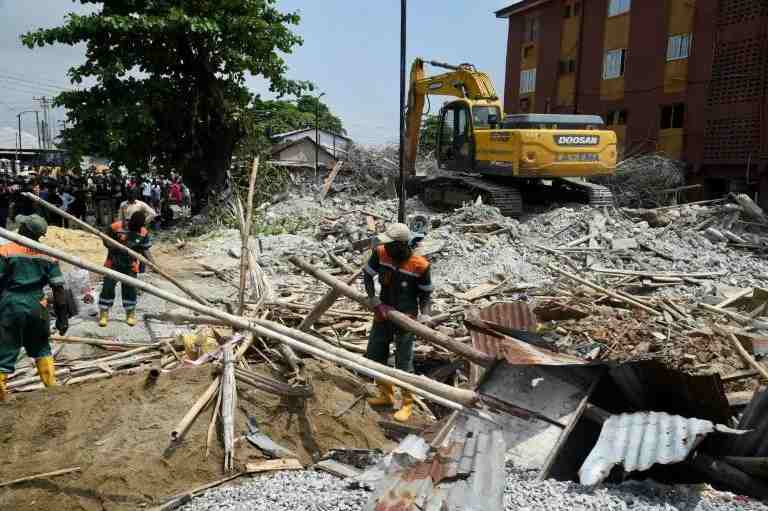On the site of a luxury shopping centre under construction in Nigeria’s economic capital Lagos, a young builder steps gingerly along the top of bamboo scaffolding.
Barefoot, with no rope to protect him, the young man carries a long iron rod on his shoulders. The fear is written on his face — one misstep could be fatal.
The scene is all too common in the megacity’s upscale neighbourhoods, where extreme wealth and dire poverty cohabit.
Builders, many just out of their teens, work day and night in deplorable conditions, raising condos and malls from the ground.
Those construction sites are just like the 21-storey high-rise that collapsed on Monday, killing at least 36 people including many workers.
State authorities have set up an independent panel to probe the cause of the collapse, but according to the governor, “mistakes were made from all angles”.
“What is certain is that this tragedy could have been avoided,” the manager of a construction company in Lagos, told AFP on condition of anonymity.
“There are always tell-tale signs when a building is about to collapse, like cracks on the walls.”
“The majority of construction companies in Lagos do not respect the norms… and to make more profit, do not hesitate to overlook quality,” said the manager.
His services are twice as expensive than most of his competitors, because he’s “one of the few that follows the rules,” he insisted.
The head of a real estate company in Lagos, who also asked to remain anonymous, said that “developers cut corners in a bid to save cost, thereby risking people’s lives.”
– ‘Improvising’ –
Since 2005, at least 152 buildings have collapsed in the city of some 20 million people, according to data collected by researcher Olasunkanmi Habeeb Okunola, from the university of Witwatersrand in South Africa.
One of those incidents that particularly angered Nigerians was in 2014 when hundreds of people died in a church collapse in Lagos.
After the latest tragedy on Monday, two more buildings collapsed later in the week, luckily without causing any injuries.
According to Okunola’s research, collapses are “directly linked to greed and ignorance of the developers in charge of building construction.”
Other factors, from “ineffective monitoring of building development… unqualified or unskilled builders… and corruption of government officials in charge of building plan approvals,” play a role too.
Steps away from the scene of Monday’s collapse, three builders, with no protective equipment or even shoes, are busy working under the scorching sun.
The 23-year-old structural engineer in charge of the site, admits sometimes “improvising” a bit, and said the cement used wasn’t always good quality.
“It’s like this everywhere,” he said.
When state inspectors come on site, “there’s always a way to settle things,” he said in a whisper.
“We have no first aid kit, no toilets for the workers, no boots… accidents happen,” said the young engineer.
On average, the workers earn about 4,000 naira ($9) per day.
“We don’t have a choice, we do this because we can’t find anything else,” said one of the workers, his body covered in scars.
Falling oil prices and the coronavirus pandemic have battered Nigeria’s economy, pushing the country of 210 million people into its second recession in five years.
“There are no jobs,” said the worker, “so here, money counts more than life.”
source: yahoo




